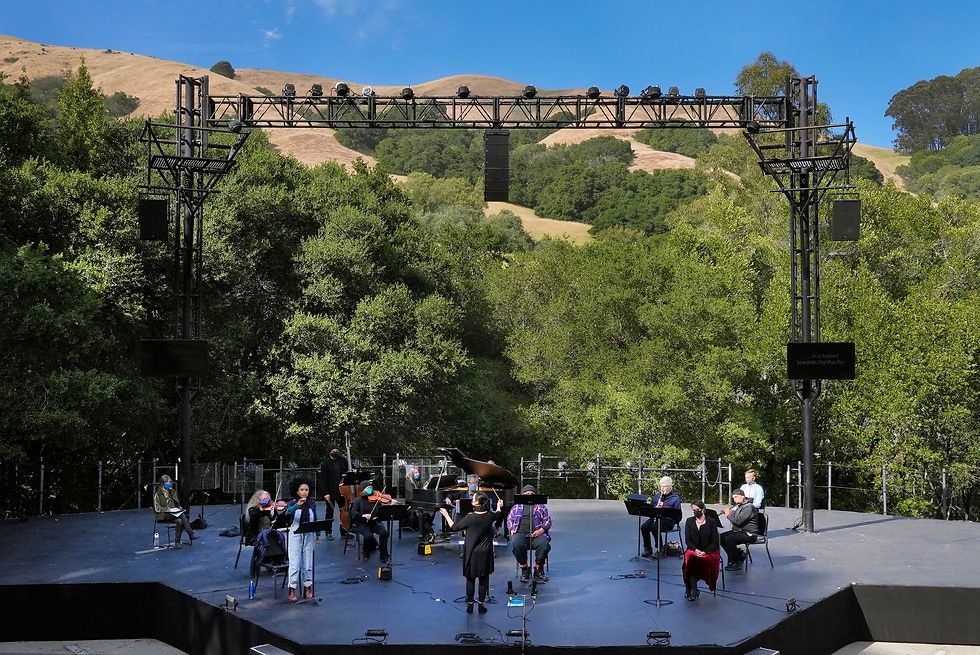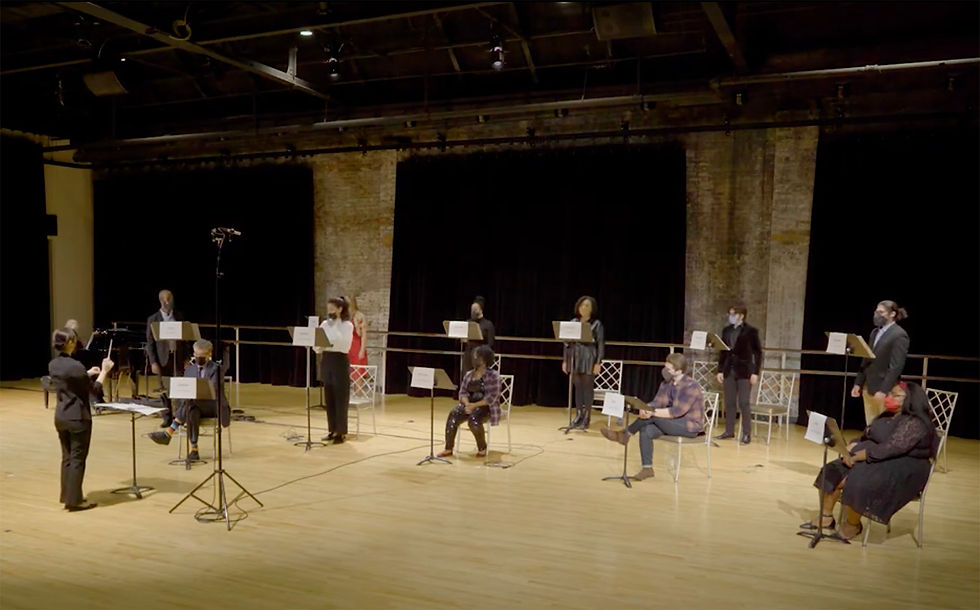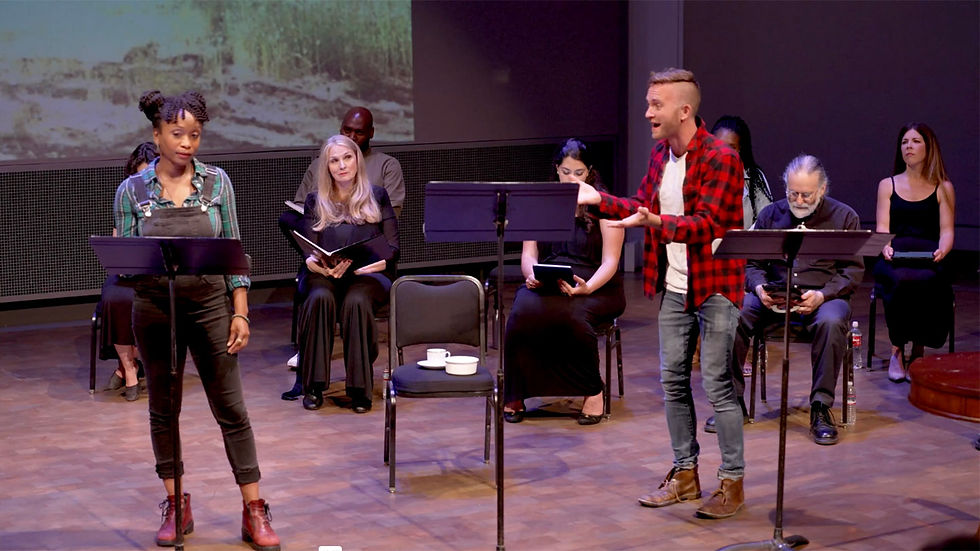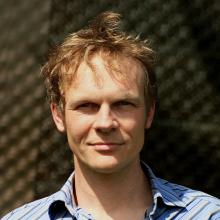How would the two of you describe the relationship between a composer and a conductor?
Nathaniel Stookey: Emily, you want to start?
Emily Senturia: I was going to ask if you wanted to start.
NS: That encapsulates the relationship right there! (laughing).
ES: Well, it depends on what part of the process we're in because at the beginning, the composer has a much clearer idea of what they want the piece to look and sound like. As they build the language for the piece’s style, it may be a style that the conductor hasn't thought of before or it's less familiar to them.
It took me a year to really understand what Bulrusher music was going to sound like at its best.
So in the beginning of the process, I'm extremely deferential to the composer because they know what is in their head and I'm just being introduced to it.
Later on, when the language for the piece has been established, and as you get to know each other better as people, you get more comfortable questioning and making suggestions and getting slightly less deferential. Although I hope I'm still creating the piece as Nat wants it to be created.
NS: For me, the conductor and all the musicians together are the only way by which my music will ever be heard or understood by anyone.
So the relationship that I have with Emily - and with all the musicians - is about trying to make sure that what I hear is conveyed in a way that makes sense and feels right to them. That means that while I try to realize my own vision and sound, I am also thinking: How is Emily going to inhabit this? How are the players going to bring these parts to life? They are the reality of the music and I'm just the idea of the music.
Emily, do you remember some of your initial conversations with Nat about the opera? And do you remember your first impressions of the music?
ES: My first involvement with Bulrusher was in the Snapshot program that we did in 2021 at The Bruns Amphitheater, which was the first performance I had done in 14 months.
I remember feeling incredibly lucky to be doing any music at all. And the first thing that I got to do coming out of lockdown was the prologue to this Bulrusher, which is so ethereal and so beautiful. And I met Shawnette Sulker for the first time.
We performed the first version of that opening prologue. It was outdoors, perfect for this piece… And it was kind of magical.

Yes, we talked about this with Shawnette in one of our earlier West Edge Stories. That power of that particular performance, returning to live performance. The wind was stirring through the trees in Orinda and there were goosebumps across the audience - you could feel it. It was the perfect setting for Bulrusher, and a very special time of being together as an audience appreciating music once again.
ES: At that time, I don't know if I fully believed that everything would be reopened again. I thought: if this is what I do this year, if this is all I do, then I feel good about it.
I think the thing that has taken me 3 years of Bulrusher’s development to understand is how much the music is meant to sound like water. Nat’s music ebbs and flows irregularly, really like water.
I remember talking to Nat about Act 1, Scene 8 - a scene where I didn't understand all of the ‘four against three’ business. And I thought: what is this? And then I went to a beach that summer, and I watched two waves come in separately, and there's that spot where they overlap. All of a sudden I thought: oh, that's why we have the cross rhythms! It's because even though this wave might be regular, and this wave might be regular, they're not the same size, they're not moving at the same speed.
Nat has a unique way of representing the natural world which can be hard to do in Western music.
You both have gone through many stages of development with this opera. Together, you attended Opera Fusion in Cincinnati for an initial piano vocal workshop, presented an orchestral workshop here at The Atrium Theater, and then returned to Cincinnati for a complete piano-vocal workshop.
NS: We've done every outing together.
Were there ever any creative conflicts?
ES: I don’t think we’ve ever…
NS: No I don’t think we’ve ever…
ES: Wait, I thought of one!
NS: (Laughing)
ES: There’s a great scene, Act 2, Scene 1, which culminates in a fistfight.
The version that we did in Cincinnati ended when the fight was broken up by the character ‘Schoolch’, the local schoolteacher who has essentially raised Bulrusher, and that was the end of the scene. When we got new material this spring, I saw that Nat and Eisa had added a little bit onto the end of that scene, which had to do with the other character dynamics at play. But I felt that the additional ending wasn’t necessary when the scene was really about Bulrusher exploding due to so many pressures.
NS: That wasn't a conflict - I agreed with you!
ES: Though somehow it’s still in there, and we're doing it! You know, there are so many pushes and pulls in the medium of opera, because of all the different elements: the literary, and visual, and musical elements.
That's why it's so nice to have a theater director directing this piece because NJ Agwuna makes sense of it as both a play and as an opera. And the nice thing about new opera is that it doesn't have to resemble all of the things that came before. It doesn't have to fit all of the hallmarks of what we think of as traditional opera.
Honestly, the more we work on Bulrusher in rehearsal, the more we could keep talking about it.
There is so much depth in the characters and so much to talk about across all their relationships. It's nice to have that amount of depth in a medium where it used to be that you could have a story that involved some royals and a crazy plot about some kidnapping and it wasn't necessarily about the depths of their characters. And in this opera, in Bulrusher, it is definitely all about the depths of characters.

If we were to look at your text message history or play back the tape on all the conversations and workshops over the past few years between you both, was there a creative moment that defined the direction of the opera?
ES: I can answer this immediately. Ok I’m scrolling on my phone…looking… wow it is a very long thread at this point… Ok, so the moment I’m thinking of is when you, Nat, were asking me about the musical key for the epilogue because you wanted to find the best note for Shawnette.
NS: Oh, yes, that was so great!
ES: And you said that it wasn’t helpful to ask Shawnette because she's so easygoing and she sings everything so beautifully so she's not gonna tell me what her best note is! And you didn’t know if we should transpose the epilogue up a second or a third or blah, blah…
And - I was so proud of this moment - I said that we should keep the ending right where it was, in G major, because that's an ‘open-feeling’ key for string instruments. Not a lot of accidentals, and the open sound is a good thing for a rural piece set in America. That key fits the spirit of the setting. And I think, Nat, that you were so in the weeds at that point -
NS: Oh, it helped me enormously because it made perfect sense. And she also pointed out that the very first note of the opera is a G and so it connects to this kind of floating G major chord at the end, having traveled a very great distance in between. For a violinist like me, and Emily too, G is home. The home chord. It calmed me down, and I knew exactly how it was going to go.

What is a composer doing three weeks before the opera premieres?
NS: Well, hopefully some composers are attending rehearsal and being very collegial and taking singers and conductors to lunch and that sort of thing…(laughing)
But in my case, I'm still finishing the orchestration of the final moment in the opera, which the publisher is waiting for, and the copyist is standing by for. To describe the feeling of this particular kind of, uh, pressure…well…it's hard to characterize.
Diamonds are made by such pressure.
NS: An opera has many notes and words and thoughts within it. And one of the details that's crucially important in that interface from me to the players is that every part needs to feel like it makes complete sense - not just as part, not just as a cog in the machine, but separately as its own line.
This might be partly to do with the water theme that Emily was talking about. I want everything to have a sense of flow because as a melodic instrument player I think in terms of everything as lines - It's all about where lines go, and where they intersect.
And so that means that in creating the parts for the individual instruments, I spend a lot of time making sure the turn of every phrase within all the parts makes sense in terms of where it lands and where it goes. There are so many tiny details that it's very, very hard to tear this from my hands, basically, because there's always something more.
And there will be something more even after I have been over it with a fine-toothed comb, because that is the nature of this very expansive medium - especially when you're trying to, as Emily said, have characters that go deeper than the old model of royals kidnapped.
What drew me to Eisa's play is that every one of the characters is so three-dimensional that he or she could actually be the protagonist. And so that means that every arc has an emotional logic to it.
And every love story within play and now opera, of which there are many! And I don't just mean the love story between Bulrusher and Vera, and the love story with Bulrusher and Boy, and Madame and Logger, and Madame and Schoolch, but there’s also Madame and Bulrusher and Logger and Bulrusher and Schoolch.
There are so many of these relationships that I feel need their due. And to do that in a piece that lasts only a couple hours is really challenging because it means distilling, taking out everything that does not bring us forward either in action or in that emotional arc of each character and their interweaving. It's just a monumental thing, opera.
It's enormous. The more you lean in, the more it grows.
NS: Yes. That's where I am, but it is going to be released from my hands and there it will be.
Emily, where are you at in the process right now? You’re in the rehearsal room going scene by scene?
ES: Yes, right now, we are staging. We worked on Act 1, Scene 8 - the scene at the river - this morning. And I think this afternoon we're doing Act 1, Scene 5, which is Logger’s aria as he braids Vera's hair.

Anything coming up for you that's odd or curious as you rehearse in the room?
ES: One of the things that Nat has helpfully provided is times of - I don't want to say silence necessarily - but places to rest.
And the most important thing that happens in staging is figuring out how much subtext needs to happen in that moment before you can go on. And so we're doing a lot of talking in rehearsal.
NJ likes to direct from the music, and so we start by singing through the music without any blocking or staging - to get an aural sense of what's happening.
And then we discuss the characters and what they might be thinking when they say a line - whether they are speaking honestly or might be thinking something different than what they're saying. We make decisions about when there's time to rest between printed phrases and when it's time to press on. And that's where the fun part of staging happens.
I want to fast forward to opening night. To time travel to 30 minutes before the curtain of the opening. What does a composer or a conductor think about just before an opera begins?
ES: The week, or a couple of weeks, leading into an opening night are always the most fun - the most bonkers time that you will ever have in the theater. There's always so much happening. It's all of the disparate parts coming together.
We are figuring out where we have loose ends and working to tie them all up before we present something to the public. I usually find that up until maybe 20 or 10 minutes before downbeat, I am still thinking about all the 300 details, thinking: ‘did I give that note to the clarinetist? Did I say that thing to that cast member to make it clear that they can come in themselves. Did I bring the correct shoes today?’ All the little things are on my mind.
And then hopefully in the last 10 minutes or so before I start, I can take a little bit of reflecting time and just think: we are here, we are making art, we are presenting it openly, and we hope that the audience will receive it openly. And that's more important than all the 300 details, and yet it wouldn't happen without the 300 details! It's a zooming in and a zooming out simultaneously.
NS: Well, unlike Emily, I have nothing important or valuable to do in the last week leading up to the show, which means that all of the enormous stress that I feel that surrounds a premiere, I just have to pretend doesn't exist.
ES: (laughing)
NS: (laughing) Basically, for me, leading up to a premiere is play acting. I'm being calm and letting the people do their thing and just enjoying the moment…But that's all an elaborate disguise!
Premieres for composers are pretty much like getting up in front of a large hall full of people, you know, naked with perhaps an unflattering birthmark and really hot, detail-oriented lighting.
What I really love about making music is the moment when things come together, with the musicians together in the room, and we’re all really listening and really enjoying. All the stress that I feel after reaching that point, I put aside.
And for the premiere itself? I just try to forget about myself as an artist with an ego -- and let myself go for the ride.





Comentarios